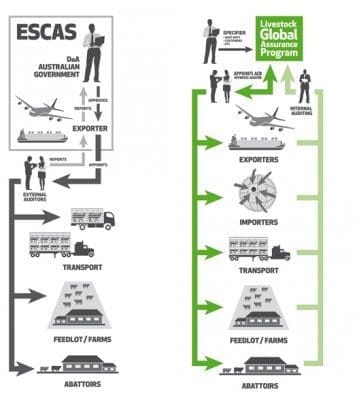The livestock export industry appears closer to introducing a new animal welfare assurance program, over and above the Government-administered Exporter Supply Chain Assurance System (ESCAS).
The Coalition Government has announced it will commit $8.3 million toward the implementation of the Livestock Global Assurance Program (LGAP), if it wins this weekend’s election.
LGAP is an animal welfare assurance program that has been developed by the industry with MLA/LiveCorp funding over the last 18 months.
Trials of LGAP were completed in selected markets last year. The industry is still considering a final research report and recommendations.
Industry-wide agreement is still required before the program can proceed, despite the Coalition’s funding commitment
The industry says the program has not been developed to replace ESCAS.
Rather, it has been developed to support better compliance with the ESCAS regulatory system along the supply chain, by providing increased levels of assurance that animal welfare and management standards are in place and being fulfilled.
The goal of LGAP is to ensure animals are treated in accordance with international guidelines, in any market, and at all stages of the export supply chain .
LGAP is built on the ESCAS pillars but the welfare requirements are more comprehensive as LGAP provides for recognition of higher welfare standards. Base standard is OIE, Level 2 is ESCAS and Level 3 is a “best practice”.
Its spreads responsibility for upholding welfare standards across all stakeholders in the supply chain, not just on exporters as ESCAS does.
It enables more targeted enforcement of welfare standards to specific establishments through certification, internal and external auditing requirements.
The program will be overseen by a member-based company with a board of directors independent of industry and Government.
The model ensures LGAP will operate at arm’s length from industry, countering suggestions it is simply “self-regulation by exporters”.
The Australian Government will still be the regulator of the Australian livestock export trade when LGAP is implemented.
The Coalition is also taking further steps to introduce a more effective way of punishing exporters who repeatedly breach ESCAS welfare standards.
As ongoing ESCAS breach reports show, current sanctions are failing to ensure all companies meet their welfare obligations under ESCAS.
The Coalition announced a full overhaul of the Federal Export Control Act in December last year. As part of the new legislation it is planning to include tougher penalties, such as a demerit point accrual system that would give the Government greater power to suspend or remove a repeat offender’s export license in future.
However, the new Act is unlikely to be in place until late 2017 at the earliest, and that process also relies on a Coalition election victory this weekend.
While some exporters may hope LGAP will eventually replace ESCAS, any likelihood of that happening would seem a long way off, if it all, and would seem only possible if it followed a long-period of proven compliance to LGAP and evidence of better welfare outcomes across the board.
The Australian Livestock Exporters’ Council chief executive officer Alison Penfold welcomed the Coalition’s commitment to the program.
She described LGAP as “an improved and strengthened system” which has been designed to provide assurances that animals are treated in accordance with the ESCAS Animal Welfare Standards for Australian livestock from discharge to the point of slaughter.
“LGAP aims to do more for improving the welfare of all animals in foreign markets because it is not limited in its scope to Australian livestock only,” she said.
“Importantly, it will also be able to place requirements and consequences on in-market importers, auditors, feedlots and abattoirs – not just exporters.
“This will go a long way to addressing the concerns raised by our industry’s critics.”
Ms Penfold said ALEC members have provided in-principle support for the implementation of LGAP, but know that it’s initial implementation and success requires Australian Government support.
“That’s why today’s funding commitment is significant for our industry.”
Cattle Council also welcomed the funding commitment for LGAP, which has been developed using both grassfed beef and livestock export levies.
CEO Jed Matz said LGAP would help to provide greater transparency in the livestock export supply chain so beef producers and the community can have comfort that Australian animals will be safe.
“The Coalition’s election commitment will provide the support needed to ensure the complete implementation of the program and allow for industry to continue to meet the high animal welfare standards expected by Australian producers when exporting their cattle into foreign markets.”

